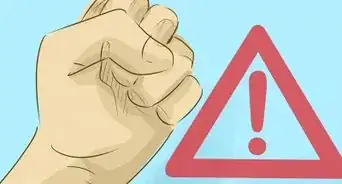This article was co-authored by Kelli Miller, LCSW, MSW. Kelli Miller is a Psychotherapist based in Los Angeles, California. Kelli specializes in individual and couples therapy focusing on relationships, depression, anxiety, sexuality, communication, parenting, and more. Kelli also facilitates groups for those struggling with alcohol and drug addiction as well as anger management groups. She is the author of “Professor Kelli’s Guide to Finding a Husband” and the award-winning and best-selling book “Thriving with ADHD”. Kelli co-hosted an advice show on LA Talk Radio and is a relationship expert for The Examiner. She received her MSW (Masters of Social Work) from the University of Pennsylvania and a BA in Sociology/Health from the University of Florida.
There are 8 references cited in this article, which can be found at the bottom of the page.
wikiHow marks an article as reader-approved once it receives enough positive feedback. This article received 12 testimonials and 92% of readers who voted found it helpful, earning it our reader-approved status.
This article has been viewed 47,829 times.
Tweens and teenagers often get angry. It can sometimes be difficult to control anger, which can cause problems in school, at home, and with your friends. However, there are lots of ways that you can cool down and stop your anger from getting out of hand.
Steps
Calming Yourself Down
-
1Notice when you start to feel angry. Your body starts to give hints that you are becoming angry before you even realize it. If you recognize your body's warning signs, you can calm yourself down before you do or say something you regret.
- You might feel yourself breathing faster than usual, or maybe your face is red and feels hot. Your hands might be clenched in fists, or you mind find that you are tensing up your jaw.[1]
- Try to name the feeling you are experiencing and attribute it to something that happened as well. For example, you can try saying to yourself, "Okay, I'm mad because I didn't get what I wanted from that teacher. This is an uncomfortable feeling, but it will pass, then I can say something or ask her about it."
-
2Take deep breaths and think about something else.[2] As you feel your body warning you that you are becoming angry, try to calm yourself down right away. The more your body becomes agitated, the more difficult it will be to calm down.
- Breathe in through your nose as deeply as you can as you count to five. Then, breathe out through your mouth as you count down from five. Repeat this a couple of times.
Advertisement -
3Try using visualization to calm down. Using visualization can help you to gain insight about yourself and it may help you to calm down as well.[3] You can use a guided visualization CD or do a simple guided visualization on your own. The next time you are feeling angry, try sitting in a quiet, comfortable place and closing your eyes.
- You can also play some relaxing music to help you stay focused.
- Keep your eyes closed and then begin to visualize a serene place, such as a quiet lake in a forest, a sandy beach, or a mountaintop. Focus on the sights, sounds, smells, and feeling of this place.
- Continue doing this for around 10 to 15 minutes.
-
4Get a stress ball. Stress balls can help you calm your anger down. Keep the ball with you when you know you're likely to get upset, like at school or at home, and squeeze it when you feel yourself start to become angry.
- You can pretend that the ball is the situation that is making you angry. Squeeze it and feel yourself releasing some of that anger into the ball.
- If you don't have a stress ball you can make one.
-
5Listen to calm music.[4] Before you go to school or another place that you feel angry, listen to calming songs. You can even make a playlist on your MP3 player or phone with songs that make you feel calm, confident, or happy. Take deep breaths while listening; this will calm you down more.
- Try songs like Dan Wilson's "All Will Be Well," "Brave" by Sara Bareilles, or Bob Marley's "Three Little Birds." Some people with anxiety say that songs like these help them to stay calm when they're feeling upset.[5]
-
6Try a quick strategy to take your mind off your anger. There are lots of things that you can try. Keep trying new strategies until you find one that works best for you. You might try:[6]
- Counting to 10 slowly
- Asking someone you love for a hug
- Drawing a picture or painting a picture showing how you feel
- Getting outside to do something active, like running, riding a bike, or playing your favorite sport[7]
- Asking a parent or guardian for a chore or task like baking cookies, folding laundry, or pulling weeds in the garden
Dealing With Others When You're Mad
-
1Learn to say how you are feeling, even if you are very mad. Instead of yelling, saying mean things, or pouting and not saying anything at all, you should express the way you are feeling. If you don't say how you are feeling, the anger will build up inside of you until you do or say something you regret.[8]
- Try telling the person, "I am so upset right now. I can't talk about this until I calm down a little bit."
- You might also say, "I feel so embarrassed and angry when you call me that."
-
2Ask for what you want and need. Sometimes teens and tweens get mad because they are disappointed, confused, or because someone does something they don't like. But other people won't know why you are upset or how to help you unless you say.
- Don't just sit and let the anger grow inside of you. Talk to the person who upset you.
- If you are mad because a friend is gossiping about you, tell your friend to stop. Try saying, "I feel hurt when you talk about me. I want you to stop talking about me when I am not around."
-
3Treat other people how you want to be treated. Just because you are angry about something doesn't mean it's okay to hurt others. When you're mad, take a minute to think about what you say or do. Don't ever hit anyone or call someone names just because you're mad.
- Try to remember that being mean when someone is making you angry will not fix the problem. All it will do is cause more problems, and maybe even get you into trouble.[9]
-
4Figure out a solution. If you are angry about something in particular, think about what needs to change for you to feel better. Getting mad doesn't usually change things, but you can take action to make the situation better or keep it from happening again. [10]
- Is someone treating you unfairly? Perhaps you could explain the problem to them and ask them to treat you differently. Are you angry because your teacher gave you so much homework? Ask your parent to help you work through it, then do something you enjoy like playing ball outside.
Preventing Your Angry Outbursts
-
1Figure out what is making you so mad.[11] There are a lot of things that might anger you. Figuring out which things are your "triggers" that set you off can help you avoid those situations.[12]
- Sometimes there is one thing that makes you mad, like when your parents don't give you what you want or don't listen to you. If you can identify which situation makes you angry, you can avoid it or prepare ahead of time to not get so angry when it happens.
- Sometimes you might feel angry about everything that happens, even if it is something that doesn't normally make you mad. If this happens, it might be because you are starting to go through puberty, which is normal and common at this age. Talk to your parents or doctor if you think that this might be the case.[13]
-
2Report bullies or other people who make you mad on purpose. If there is someone at school who is picking on you or making you mad, tell someone about it. Talk to a parent, teacher, or school counselor about what is going on.
- You may also want to do whatever you can to avoid the person until the issue is resolved, such as taking a different route to school or steering clear of the person during lunch.
- Check out this helpful article if you need help dealing with a bully in your life.
-
3Talk to a counselor or other adult you trust. Your school counselor can calm you down and help you make good decisions even when you're upset. Try setting up a meeting with your school counselor to discuss your anger issues.
- Try saying something like, “I am struggling to control my feelings of anger sometimes and I think I need some help.”
- If you're very angry, tell both your parents and the staff of the school.
-
4Be sure you're getting enough rest. Some teens and tweens get angry more often if they are tired. Be sure you are getting enough rest at night, and not trying to do too many activities during the day when you're not well-rested.
- Tweens and teens need between 9 and 10 hours of sleep every night. That's a lot! But most tweens and teens only get 7 hours of sleep.[14] If you're not getting enough, you might need to go to bed earlier if you have to get up early for school.
- You can also try taking a cat-nap for an hour or so after school if you are feeling really stressed out.
-
5Make sure you are getting enough to eat and drink. This might sound silly, but many people have more angry outbursts when they're hungry or thirsty. Even adults can get "hangry"-- hungry and angry!
- Try to eat healthy foods instead of foods high in sugar or fat. Snacks like string cheese, apples with peanut butter, or a banana can help keep you from feeling angry.
-
6Try practicing prayer or deep breathing. Even teens and tweens can learn to relax themselves using prayer or meditation. Try whichever one is right for you, and do it regularly, not just when you're feeling angry.
- Try spending five or ten minutes at night before bed relaxing with deep breathing. This can help you sleep better and calm your feelings.
- You might also try a nightly thankfulness prayer. You can say thank you for all of the good things in your life and remember that the things that make you angry are small in comparison to all the good things you enjoy.
Expert Q&A
-
QuestionHow can I control my anger as a teenager?
 Kelli Miller, LCSW, MSWKelli Miller is a Psychotherapist based in Los Angeles, California. Kelli specializes in individual and couples therapy focusing on relationships, depression, anxiety, sexuality, communication, parenting, and more. Kelli also facilitates groups for those struggling with alcohol and drug addiction as well as anger management groups. She is the author of “Professor Kelli’s Guide to Finding a Husband” and the award-winning and best-selling book “Thriving with ADHD”. Kelli co-hosted an advice show on LA Talk Radio and is a relationship expert for The Examiner. She received her MSW (Masters of Social Work) from the University of Pennsylvania and a BA in Sociology/Health from the University of Florida.
Kelli Miller, LCSW, MSWKelli Miller is a Psychotherapist based in Los Angeles, California. Kelli specializes in individual and couples therapy focusing on relationships, depression, anxiety, sexuality, communication, parenting, and more. Kelli also facilitates groups for those struggling with alcohol and drug addiction as well as anger management groups. She is the author of “Professor Kelli’s Guide to Finding a Husband” and the award-winning and best-selling book “Thriving with ADHD”. Kelli co-hosted an advice show on LA Talk Radio and is a relationship expert for The Examiner. She received her MSW (Masters of Social Work) from the University of Pennsylvania and a BA in Sociology/Health from the University of Florida.
Psychotherapist Try to find the things that trigger your anger and try to avoid them in you possibly can. Otherwise, try to find healthy outlets, such as listening to music, exercising, and journaling.
Try to find the things that trigger your anger and try to avoid them in you possibly can. Otherwise, try to find healthy outlets, such as listening to music, exercising, and journaling.
References
- ↑ http://kidshealth.org/en/kids/anger.html#
- ↑ Kelli Miller, LCSW, MSW. Psychotherapist. Expert Interview. 11 June 2020.
- ↑ http://psychcentral.com/lib/guided-visualization-a-way-to-relax-reduce-stress-and-more/
- ↑ Kelli Miller, LCSW, MSW. Psychotherapist. Expert Interview. 11 June 2020.
- ↑ https://themighty.com/2016/02/20-songs-people-listen-to-when-anxiety-keeps-them-up-at-night/
- ↑ http://kidshealth.org/en/kids/anger.html#
- ↑ Kelli Miller, LCSW, MSW. Psychotherapist. Expert Interview. 11 June 2020.
- ↑ http://kidshealth.org/en/kids/anger.html
- ↑ http://kidshealth.org/en/kids/anger.html#
- ↑ http://kidshealth.org/en/kids/anger.html#
- ↑ Kelli Miller, LCSW, MSW. Psychotherapist. Expert Interview. 11 June 2020.
- ↑ http://kidshealth.org/en/kids/anger.html#
- ↑ https://www.empoweringparents.com/article/anger-rage-and-explosive-outbursts-how-to-respond-to-your-child-or-teens-anger/
- ↑ http://www.nationwidechildrens.org/sleep-in-adolescents
-Step-1-Version-2.webp)
-Step-2-Version-2.webp)

-Step-3-Version-2.webp)
-Step-4-Version-2.webp)
-Step-5-Version-2.webp)
-Step-6.webp)
-Step-7.webp)
-Step-8.webp)
-Step-9.webp)
-Step-10.webp)
-Step-11.webp)
-Step-12.webp)
-Step-13.webp)
-Step-14.webp)
-Step-15.webp)
-Step-16.webp)






























































Medical Disclaimer
The content of this article is not intended to be a substitute for professional medical advice, examination, diagnosis, or treatment. You should always contact your doctor or other qualified healthcare professional before starting, changing, or stopping any kind of health treatment.
Read More...